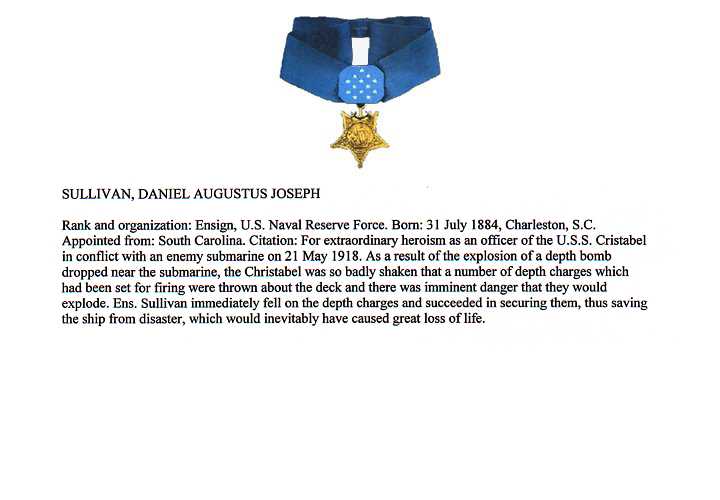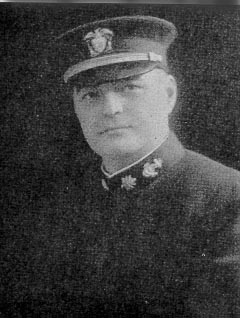SULLIVAN-DANIEL
DANIEL AUGUSTUS JOSEPH SULLIVAN

ENS


Seapower played a crucial role during the First World War. The Allies, especially Great Britain, were dependent upon ocean-borne commerce for much of their food and raw materials. Moreover, vital troops and supplies, whether from the United States or other areas, could reach the battlefields in France only by ocean transport. To counter the Allies' numberical advantages at sea, Germany unleashed a new weapon of terror: the submarine. The German U-boat proved to be highly effective in sinking merchant shipping, destroying almost 900,000 tons of shipping in April 1917 alone.
When the United States entered the war in April 1917, it quickly became apparent that the U.S. Navy would have to neutralize the U-boat threat before American troops and supplies could be safely moved from the United States to France. This task turned out to be quite a challenge for the U.S. Navy, because it did not have enough destroyers to do the job properly. The shortage of destroyers was an especially crucial deficiency, since there were a limited number of French ports that the Ynited States could use to disembark its troops and supplies. The Germans also knew this, so it was expected they would concentrate their U-boats near those ports and try to intercept the convoys as they entered port.
Since the Navy's inventory of destroyers was inadequate to meet the German submarine threat, the Navy bought or requisitioned a number of civilian yachts and converted them into warships. Among them was Irving T. Bush's Christabel. The USS Christabel was commissioned into naval service on May 31, 1917. At 250 tons, Christabel was one of the smallest converted yachts. Christabel and five other converted yachts left New York on June 9, 1917. Like the other converted yachts, Christabel's crew was made up almost entirely of reservists, volunteers, or recent recruits. Many in the crew of these ships had little or no sea-going experience. The squadron arrived in Brest, France on July 4, 1917 and began escorting coastal convoys almost immediately.
On May 21, 1918, while escorting the British merchant ship Danae, which was a slow-moving vessel that had fallen behind a convoy bound from La Pallice, France to Brest, Christabel encountered a German U-boat. A lookout spotted a wake about 600 yards off the port quarter. Christabel proceeded and dropped a depth charge with no visible results. Several hours later another wake was discovered, and once again Christabel prosecuted the submarine. This time, when the U-boat was localized, Christabel dropped two depth charges. Although the first depth charge produced no visible results, the second triggered a violent secondary explosion, which knocked one of Christabel's depth charges loose from its mounting. Ensign Sullivan, acting quickly before the depth charge's contact fuse detonated the explosive, jumped on the depth charge and secured it from further risk to the ship. Satisfied that the U-boat had been sunk, Christabel continued on its duties. Three days later, Christabel's victim, the German U-boat UC-56, entered the port of Santander, Spain. Badly damaged, she was out the rest of the war there.
- taken from Honor, Courage and Commitment: United States Naval Reserve Medal of Honor Recipients, Naval Historical Center

